Profile
Venoms that kill your motivation and their antidotes

It’s hard to keep motivation alive sometimes
Here’s a short story that may or may not sound familiar. One day an enticing and fresh idea knocks on your door, you welcome it into your life and soon it blossoms into an exciting new project you can’t wait to start working on.
So you get down to business! All hands on deck. You feel good, motivated, unstoppable and inspired. Everything goes well…at least for a while.
Somewhere along the way, things start to go south. The motivation that fuelled you at the beginning is gone and without it your project can’t survive much longer.

After this, a wave of frustration invades you. You don’t know what went wrong and honestly you are too disheartened to perform an autopsy on the ‘dead project.’
After grieving for a while, you move on to the next one, excited and motivated like before. But soon afterwards the next project dies too! And before you know it, you have a pile of dead projects buried in your backyard.
At this point you can’t help but wonder why it is so hard to keep motivation alive? Most of the time the cause of death was one (or a concoction) of these venoms listed below.
SELF-COMPARISON
Nothing drains your energy more than comparing yourself with others. Seriously, it’s an incredibly exhausting task. That’s why it’s no surprise that at the end of the day, you have no energy left to invest in your projects and personal goals.
Comparison is a natural process the human brain has been doing for ages and it’s a key feature of our species.
If you want to achieve the objectives you have set for yourself, the first thing you have to learn is how to be energy-efficient and reserve your precious and limited mental energy for the things that really matter and that will bring you something useful or productive in the long run.
For example: comparing a stunning shot of an Instagram model basking in the sun on a tropical island against ourselves on a Sunday morning is not only unfair and irrational, but also unfruitful, pointless and incredibly toxic.
And it’s called self-destructive comparison. That’s the type you don’t want to engage in.
On the contrary, comparing your habits and lifestyle with a well-planned nutrition and fitness programme, actively seeking and identifying our weak spots and be willing to improve them in order to live a healthier life, is meaningful and productive and it’s self-evaluation or constructive comparison. And that’s the type you’ll want to invest your precious and limited energy in.
In short, self-destructive comparison weakens our motivation while constructive comparison nurtures it.
STAGNATION
Think of motivation as a house plant. You need to constantly water it and nurture the soil for it to grow healthy. It will wither slowly and eventually die if you don’t dedicate time to take proper care of it.
“So what can I do to stimulate my motivation every day?” you may ask. The answer is pretty straightforward and it’s something you probably have heard about before: vision boards.
Remember that humans are visual creatures, so it’s no surprise that sometimes we need to see the things we want to achieve in order to keep moving forward. And what vision boards do best is helping you visualise your goals.
So what about creating one? They are incredibly simple to make on your electronic devices or you can even go to greater lengths, print it and hang it on your wall so you can see it everyday.
IMPATIENCE
We have to come to terms with the fact that good and worthwhile things take time and it’s imperative that we learn to cultivate the increasingly rare virtue of patience. Sometimes, especially when we are just getting started on a new project (which could be referred to as the “honeymoon period” of our projects).
While being high-spirited is important, things get dangerous when we start setting unrealistic goals.
Feeling constantly disappointed for not being able to reach the unreasonable milestones we set for ourselves, creates a sense of defeat that gradually weakens our motivation and causes us to get frustrated, disheartened and end up abandoning our projects altogether.
So what can you do to protect your motivation from the devastating effects of impatience? Start by allowing yourself to work slowly but surely by dividing tasks into small chunks and while you are at it, remember to watch out for the goals you set. Setting unrealistic goals can end your whole career before you even start.
Make it a habit to acknowledge and praise your progress, no matter how small the victory. Because seeing how much you have accomplished can give you the reassurance you need to know you are doing things right, and this knowledge helps keep impatience at bay.
PERFECTIONISM
Perfectionism slows you down and puts an unnecessary amount of pressure on your shoulders. It’s extremely time-consuming. Perfectionism affects your motivation the same way impatience does.
So, instead of sweating every little detail, worrying about every tiny thing and overthinking every small aspect of your project, try to focus on what’s really important.
Focus on the things that will really pay off and make a difference in the long run.
Being detail-oriented is a good thing, but don’t overdo it. When it comes to achieving your goals, the most important thing is to be consistent, not perfect.
Perfection is an illusion we can spend all our lives chasing after and never achieve. Instead, strive to find satisfaction in knowing that you are doing your best, learning and improving every day.
Source : Pickthebrian
Profile
Salamatu Ahmed, Ghana’s only female Hausa sports broadcaster
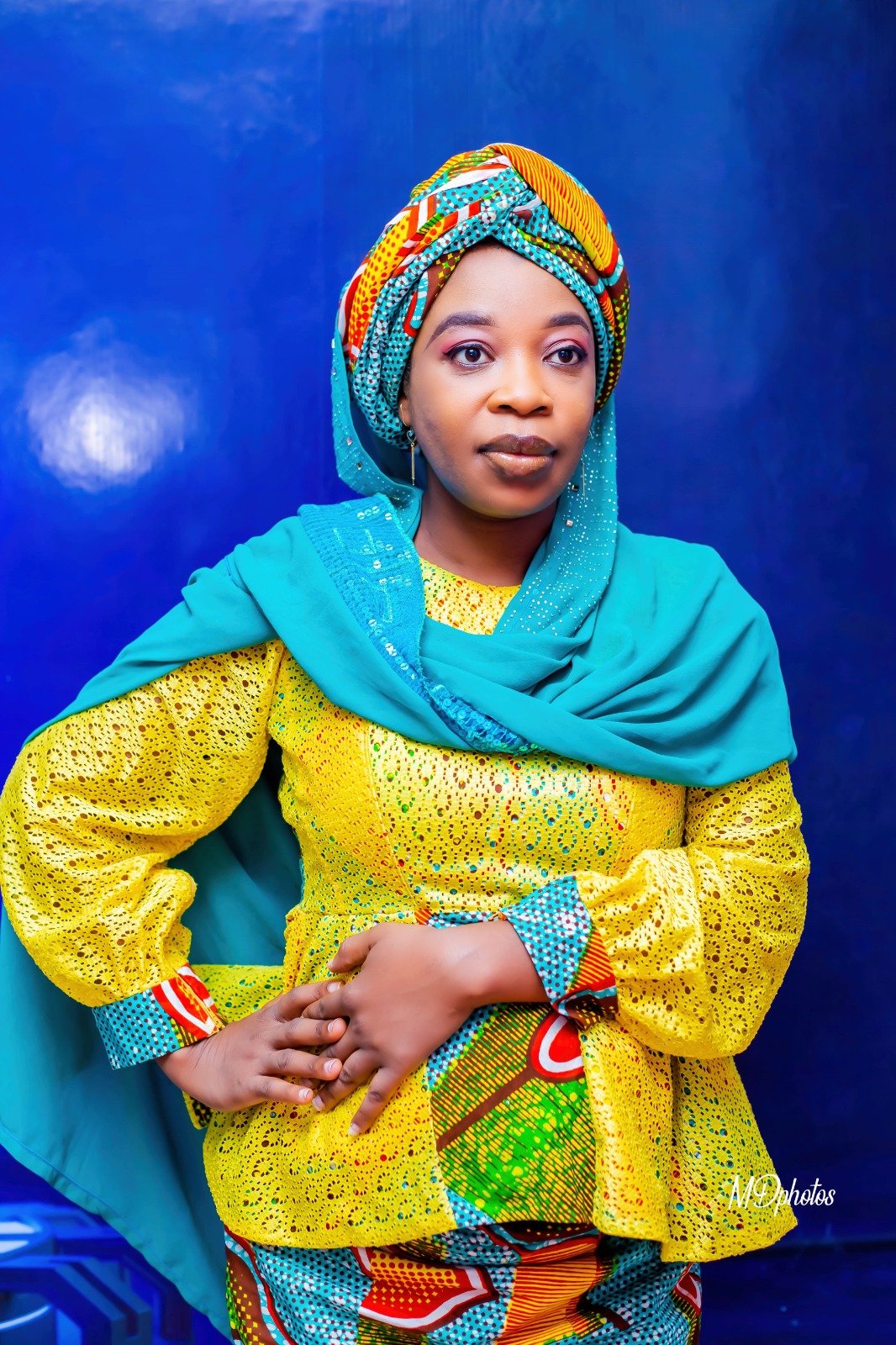
In a field long dominated by men, she has turned her microphone into a tool for change, amplifying women’s voices, promoting gender equality, and challenging deep-rooted stereotypes in sports journalism.
In Ghana’s media landscape, especially in the arena of sports, Salamatu Ahmed stands out. Not just as the host of Iqra Radio’s popular morning show, but as the country’s only female Hausa sports broadcaster.
From humble beginnings in Lagos to an influential voice behind the microphone in Accra, her journey is one of boldness, resilience, and purpose.
“I grew up in a close-knit neighbourhood in Lagos where everyone looked out for each other,” she recalled in an interview with The Spectator on Monday. “There was no discrimination. I could enter any house, share a meal or even sleep over without raising eyebrows. That spirit of unity shaped my values.”
She said, her love for broadcasting was sparked by her father, who was an athlete and devoted news watcher. Her father loved sports and news and recounted how she used to sit with him, watching the newscasters and wondering how they memorised so much.
“I later found out they used a teleprompter-what a relief!” she said with a laughter.
Salamatu’s passion for football heightened during the France ‘98 World Cup. “I watched almost all the matches. That tournament made me fall completely in love with the game,” she said.
But it was not until years later that broadcasting became a real career path-and quite unexpectedly.
She recounted how a friend of hers was managing Hijra TV asked her if she knew anyone who could do Hausa sports for the TV station.
She grabbed the opportunity as she was not working at the time, saying “so I offered myself,” she explained. “That was how it all started.” From Hijra TV, she moved on to Baina TV and eventually found her home at Iqra Radio.
Though her original dream was to become an English-language sports anchor, Hausa unexpectedly became her breakthrough. “People always ask how I manage to do it in Hausa, and the fascinating part is I am a woman doing it. That’s what truly sets it apart.”
But the journey has not been without hurdles. As a woman in sports media, she has had to fight for access and respect.
“It is always difficult getting interviews. Some male counterparts do not like sharing contacts or information,” she said.
Salamatu recounted how early on, men would ask for sexual favours in exchange for job opportunities. She said it got so discouraging that she left job-hunting for a while and ventured into business instead.
Now firmly established in her field, she uses her platform not only to cover sports, but to push for systemic change. As a panelist on various forums and a vocal supporter of women’s football, Salamatu has advocated for increased investment, better pay, and more opportunities for female athletes.
“Why should male footballers be paid more for doing the same job?” she quizzed during the conversation. “Female athletes often do not get bonuses or incentives that make life easier for them. People label us feminists for speaking out-but isn’t it just fairness?”
She also spoke passionately about how female athletes face scrutiny that goes beyond performance. “Look at Barbara Banda of Zambia; she faced criticism for being too ‘masculine.’ Imane Khelif, the Algerian boxer, faced similar discrimination. It’s disheartening. People forget these women are excelling at their craft.”

In 2024, Salamatu’s influence reached the global stage when she was selected to represent Ghana at the Fourth Eurasian Women’s Forum in St. Petersburg, Russia. There, she joined other global leaders in conversations about empowering women in media, politics, and business.
“That experience showed me that our voices matter beyond our borders,” she said. “We are not just fighting for recognition here; we are part of a global movement.”
Away from the microphone, Salamatu is known for her bubbly personality. “I am a fun-loving person-anything fun, count me in! I love cooking, watching movies, and reading.”
She credits her background-a Muslim from a Zango family for instilling in her resilience and discipline.
After schooling in Lagos, she moved to Ghana and earned a diploma in Communication Studies from the African University College of Communications (AUCC), now African University of Communication and Business (AUCB).
Her greatest pride is being the only female voice doing Hausa sports broadcasting in Ghana.
“Until someone else comes along, I will keep holding this fort,” she said with a smile. “It is my biggest achievement so far.”
For young girls looking up to her, she urged them never to be intimidated but rather carve a niche for themselves and be unique.
“You do not have to sound like or look like everyone else. Just be you and be excellent,” she added.
By Esinam Jemima Kuatsinu
Profile
Fiator Mordeku III of Awudome Tsito — The bridge builder in chieftaincy and architecture

Fiator Mordeku III of Tsito, known in private life as Kafui Kwame Amegbe, is a unique blend of tradition, service, and modern professionalism.
As a chief, an architect, and a community development advocate, he wears his many hats with humility, driven by a powerful dual motivation: a deep desire to serve and preserve his family’s legacy, and to play an active role in creating positive change in society.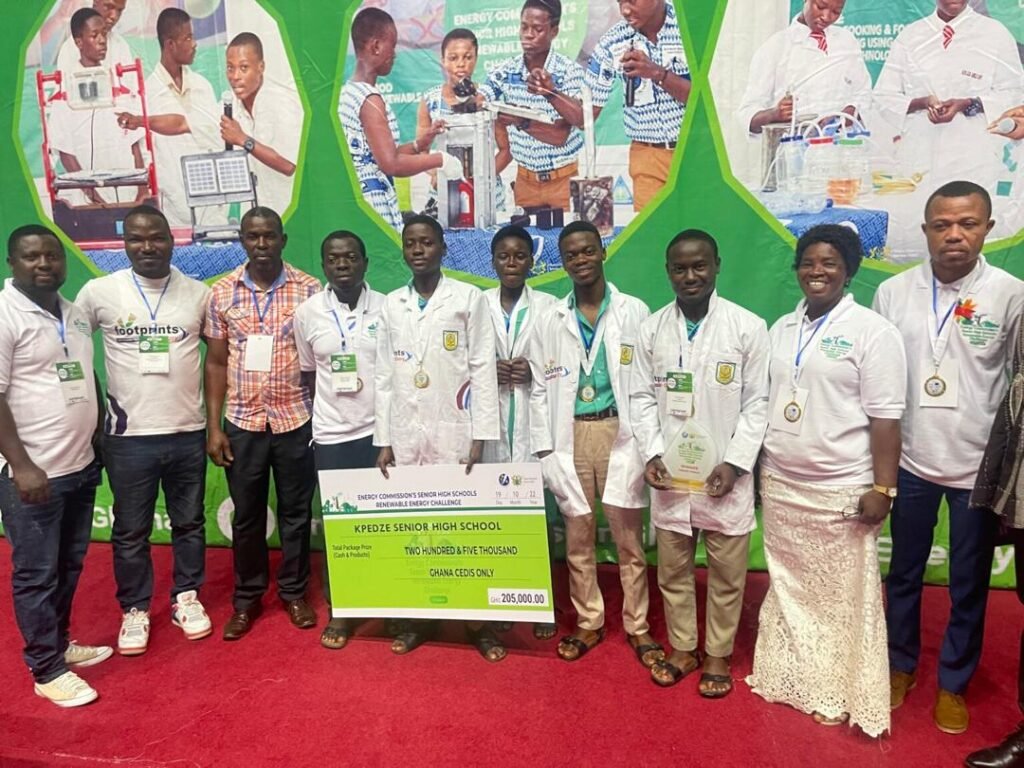
picture with winners of the Energy Commission
High School renewal energy challenge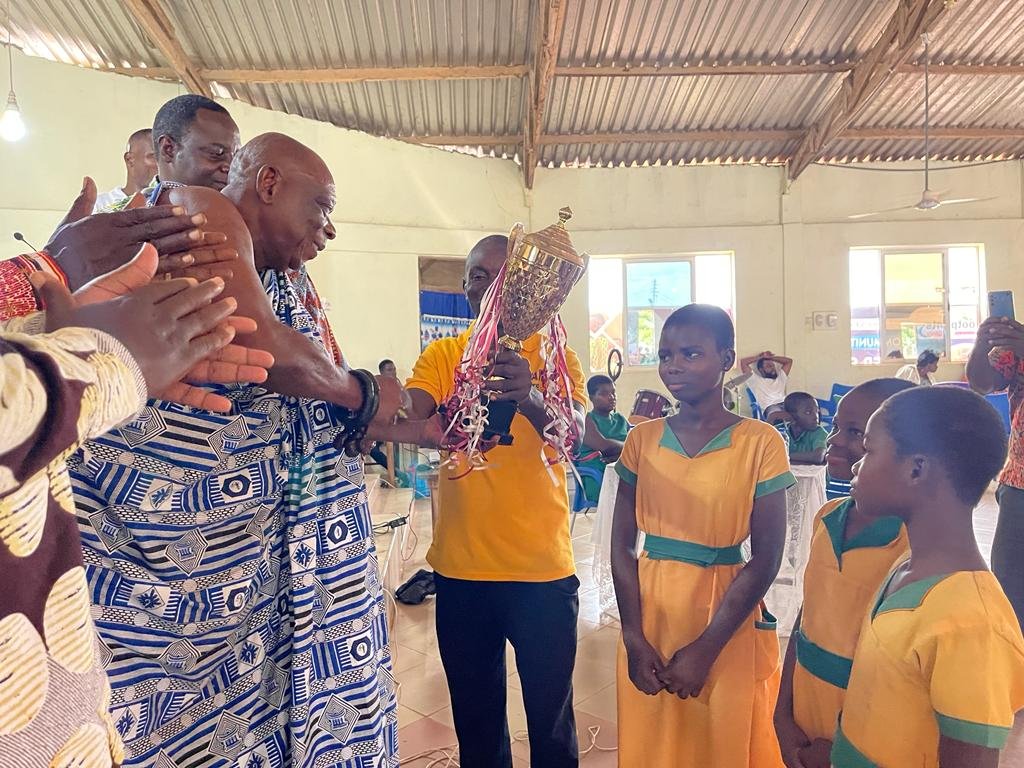
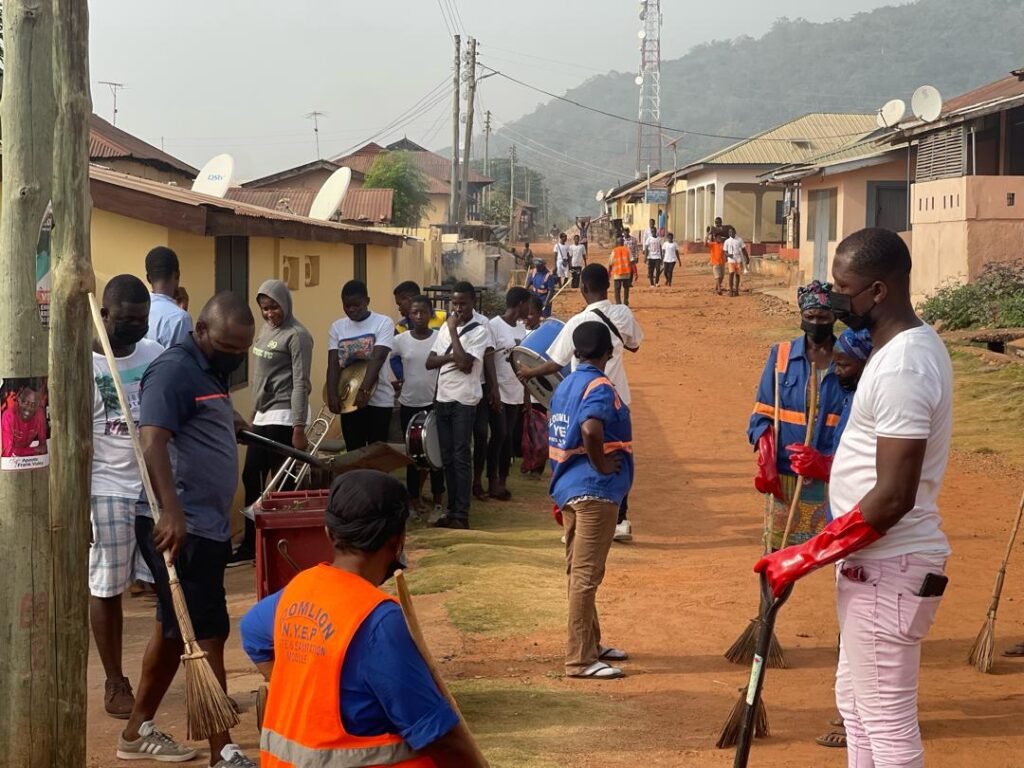
From a young age, Kafui’s life has been guided by strong values rooted in communal living.
Growing up in a close-knit family and community, he experienced firsthand the power of shared responsibility-where neighbours became second parents, and village elders doubled as life coaches.
Speaking to The Spectator in Accra on Saturday, Fiator Mordeku Ill said one childhood memory that continues to inspire him is when Togbe Gobo Dake XII, Chief of Tsito, bought him a slate for his first day in school.
Today, he serves as Fiator (father to Togbe Gobo Dake XII) to his childhood benefactor-a powerful circle of legacy and service.
“I was enstooled in my late 30s, so this journey is still quite fresh-just under two years in,” he said, by many standards that is considered quite young, especially given the weight and complexity of traditional leadership.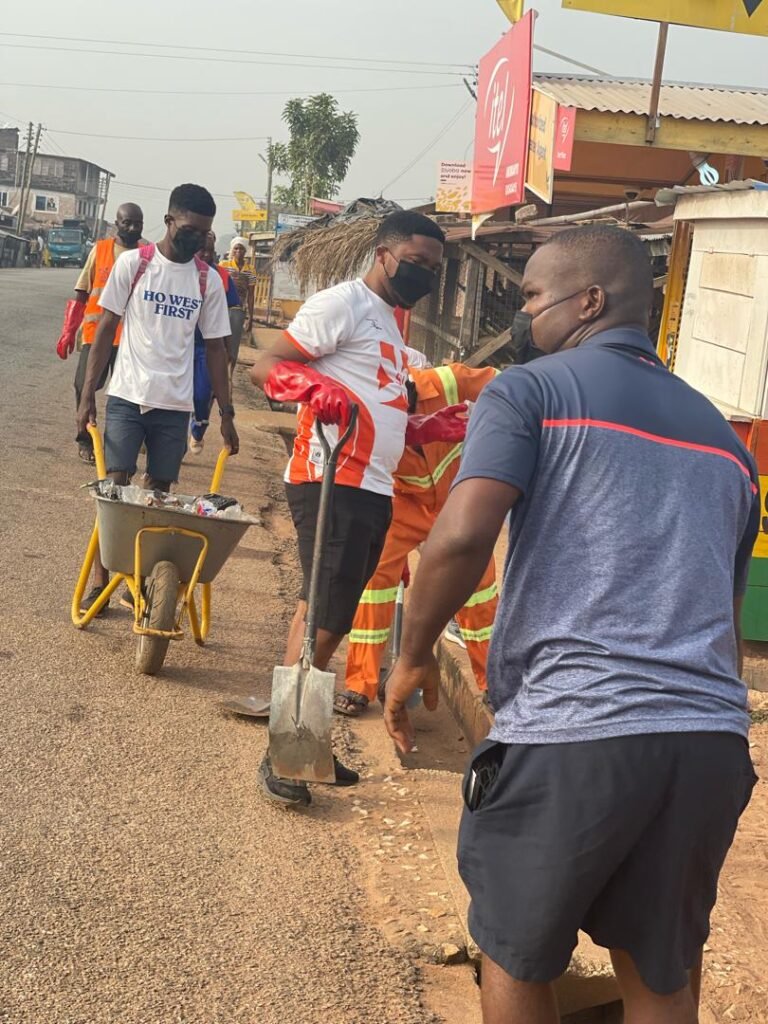
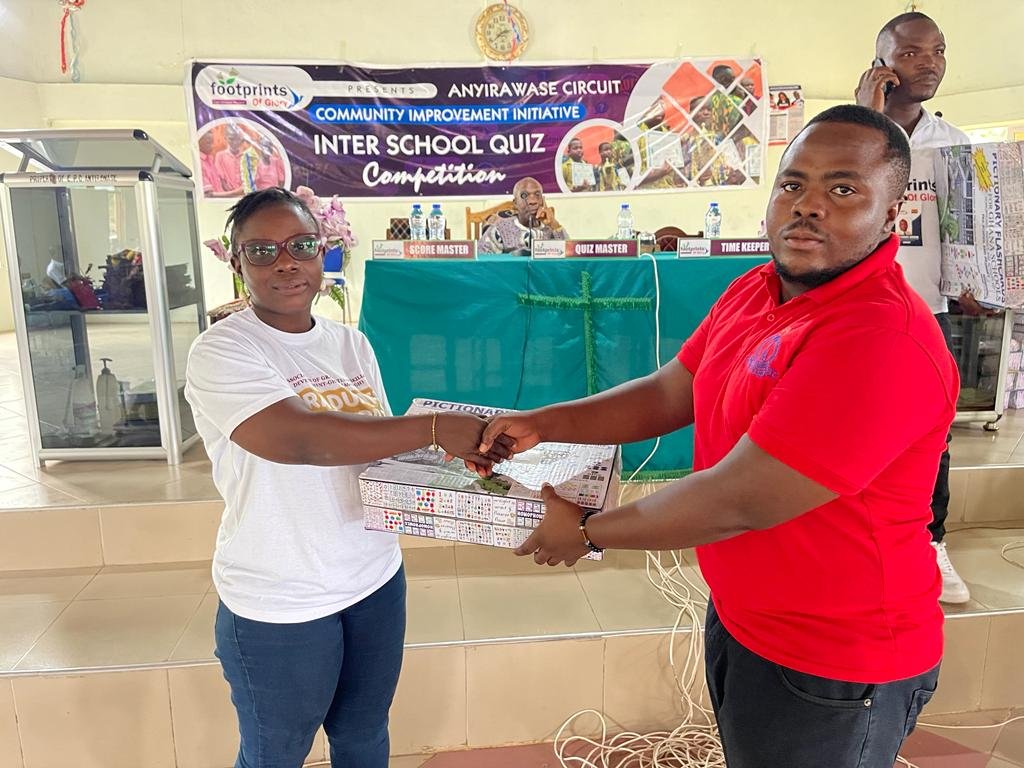

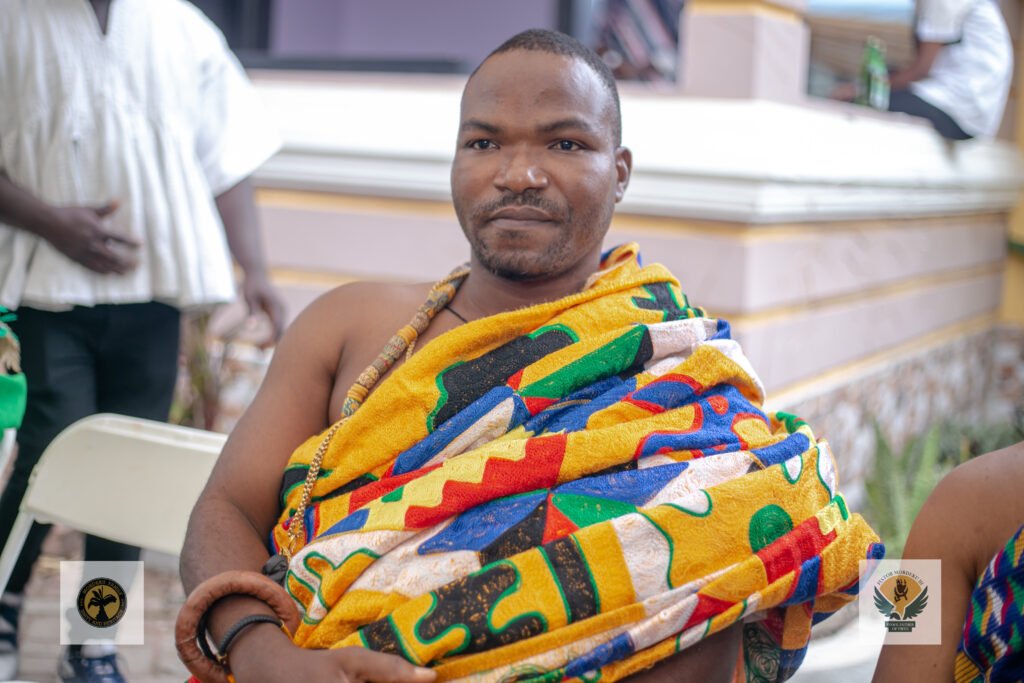
Tsito during his coronation
But I have always believed that leadership is not about how old you are; it is about preparation, mentorship, vision and most importantly, a desire to serve.
According to him, becoming a chief at a young age came with immense responsibility, saying “chieftaincy can be complex and sometimes misunderstood, but my family played a key role in preparing me.”
On the day of his enstoolment, he stood composed, not because it was easy, but because he was aware of the expectations ahead.
The reality, however, only sank in later-when the calls, community issues, and needs began pouring in. For him, leadership is not about titles but about providing proactive and adaptive leadership that reflects the needs of today’s fast-changing society.
Fiator’s reliability with the youth is a defining feature of his reign. “I am not far from the Gen Zs,” he says.
This closeness, according to him, enables him to connect with young people on a peer level, encouraging them to engage in community initiatives and understand the importance of preserving tradition. It is this connection that empowers him to blend traditional authority with modern innovation.
Outside of chieftaincy, Kafui is a passionate architect and advocate of sustainable design.
His love for designing spaces began as early as Junior Secondary School, and today, he continues to inspire with thoughtful architecture that focuses on sustainability, community needs, and the intelligent use of local materials.
To him, architecture is about how people interact with spaces, and one of his proudest contributions is his role in the design of the new Regional House of Chiefs projects across Ghana’s six new regions-a national undertaking that incorporated diverse stakeholder inputs.
His work as an architect and a chief converges in one of his most symbolic projects-a small concrete bridge he built behind his house.
It replaced a dangerous makeshift path used by locals, especially the elderly, to cross a storm drain.
“Now people walk across without fear. That one act of building a bridge, literally and symbolically, pushed me to think more deeply about the many quiet struggles people go through,” he said.
This bridge became the foundation for his greater calling – providing not just charity, but dignity and equity.
Through the Footprints of Glory Foundation, which he founded in 2020 and officially registered in 2021, Kafui has launched impactful initiatives across Tsito and the wider Awudome area.
From funding school fees and apprenticeships to constructing small community bridges and launching an online radio station (soon to become a full community station), the foundation has been a lifeline for many.
It is supported by respected individuals like Dr Yao-Foli Sekyema and Mr Michael Brefo. The foundation’s success lies in collaboration and shared purpose.
A touching example of his impact is the story of a young boy from a neighbouring village who, due to financial hardship, was working on farms despite being a top student. Fiator took him in, supported his education, and
today, the boy is university-bound-a story that encapsulates the spirit of his work.
“I don’t dwell much on legacy,” Fia
tor said. “My focus is on providing real, practical solutions that ease burdens and improve lives.”
Whether it’s mentoring architecture students, building community projects, or planning future academic pursuits.
Currently, he is studying for an MSc in Facilities Management with the aim of uplifting others through service, innovation, and collaboration.
He called on the youth to embrace discipline, humility and a deep willingness to keep learning, urging the youth not to be afraid of hard work or setbacks and that they were part of the journey.
“Find people who inspire you, ask questions, stay curious, and never forget your roots. Where you come from is your foundation, and it will keep you grounded no matter how far you go and we don’t have to wait until we are older to start serving.
He is married with three children and enjoys working out, playing lawn tennis, travelling, listening to music which he says helps him reflect, plan and recharge.
By Esinam Jemima Kuatsinu






